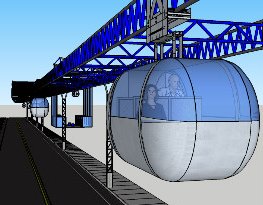CityTram
A new vision in urban commuting
A better way
to get from here to there
(faster and cheaper, reliably and safely)
Technology Some precise specifications and cost analysis.
The external specification for the CityTram technology has not yet been released for public view. It will be posted here.
You can contact us at : stephen@citytram.org
Network
A CityTram system comprises 1 or more interconnected networks. Each network is a partially populated irregular 2D grid, comprised of "runs" in 1 dimension which cross "runs" in a second dimension. Runs are typically bi-directional, comprising one "track" carrying traffic in each direction. The 2D grid is constructed in such a way, so as the distance along any run between consectutive crossings is always a multiple of 2 times the "slot distance". The "slot distance" is 44 feet.
CityTram cars travel along tracks in the network at a globally constant velocity of 30 mph (44 feet per second). The "slot time" is the time it takes a car to travel the slot distance. The slot time is 1 second. So the travel time it takes a car to travel between 2 crossings is always a multiple of 2 seconds. All crossings are globally synchronized so that runs in one dimension use the crossings during even slot times, and runs in the other dimension use the crossings in odd slot times.
Maximum track capacity is 1 car every 2 seconds (slot times), or 30 cars per minute. That amounts to 1800 cars per hour. That is a maximum capacity of 5400 passenger per hour, and a more typical capacity of 2340 passengers per hour (assuming an average of 1.3 passengers per car). This capacity can be maintained simultaneously in both directions (tracks) on a run, and on all runs in each dimension.
Passenger Pods
Passenger pods are passive (no motor). They have a small HVAC unit for environmental control of the cabin. There is also a small computer with touchscreen display. The computer and HVAC operate from a small battery able to carry a 40 minute charge. The battery is recharged when the pod is parked at a station.
Pods are equipped with landing feet to support it from the bottom when in a loading bay at a station. These feet are equipped with pressure sensors. Pods are not allowed to depart a loading bay unless the total pod weight, with passengers and cargo is under 800 lbs. The pods themselves weigh 380 lbs. So the pods can carry 420 lbs of people and cargo.
Seats are provided for 3 seating positions. Each has an occupancy sensor, and a seat belt with sensor. Pods are not allowed to depart a loading bay unless seat belts are engaged for all occupied seats.
The seats are arranged with 1 in front, on the left side, and two in the rear, side by side. They are bucket type seats, but the center arm rests on the rear seats can be collapsed to form a single wide bench. The left rear seat folds up, so the seat supports below that seat can be used as a bike rack (with 2 bike capacity). So the pod can be used by a travelling group of 2 with each having a bicycle. The front seat pivots 90 degrees toward the pod door, to make loading and unloading easier. The pod is accessed through a double wide door on the right hand side of the pod. The front right position, which has no seat, is a usable position for wheelchairs.
Doors open wide for clearence to support easy loading and unloading. A separate small trunk compartment is available for hand luggage.
parameter | spec | unit / (notes) |
height | 59 | inches |
width | 54 | inches |
length | 116 | inches |
seating positions | 3 | (collapsable) |
coefficient of drag | 0.30 | (forward) |
coefficient of drag | 0.45 | (sideways) |
weight | 380 | lbs |
Bogie
The bogie comprises upper and lower trucks joined on one side by a vertical mounting plate. Each truck houses front and back wheel clusters, with each cluster comprising a vertical load wheel and 2 horizontal track wheels. The 3 wheel positions surround the rail on 3 sides. The load wheel position on the lower truck is vacant.
A tandem swing arm is attached to the bottom of the vertical mounting plate, below the mounting position for the bottom truck. The other side of the swing arm attaches the passenger pod to the bogie.
parameter | spec | unit / (notes) |
wheel diameter | 5 | inches |
wheel width | 1.2 | inches |
wheel bearing | closed roller | |
wheel hub | aluminum | |
wheel tread | poly | |
number load wheels / truck | 2 upper , 0 lower | |
number track wheels / truck | 4 upper, 4 lower | |
number trucks / bogie | 2 | |
truck width | 14 | inches |
truck length | 32 | inches |
wheel base | 24 | inches |
swing arm length | 12 | inches |
Tracks
Tracks comprise a ladder truss made of round tube, with the truss chords running horizontally one above the other and acting as rails.
parameter | spec | unit / (notes) |
Ladder truss chord material | Aluminum alloy B221-T6 | |
chord tubes | 2.5 inch schedule-40 pipe | |
ladder truss tie material | Aluminum alloy B221-T6 | |
tie tubes | 1.25 inch schedule-40 pipe | |
chord separation | 30 | inches |
tie spacing | 32 | inches |
